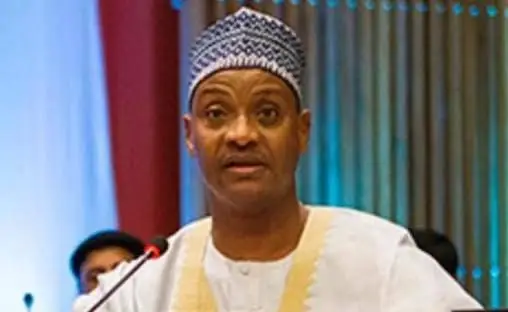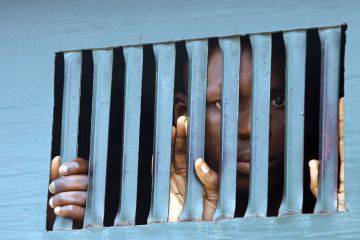Democracy & Governance
Democracy, Governance And The Nigerian Condition (2) -By Usman Sarki
The report also noted especially that apathy and indifference to the political process, low-level of political consciousness that have made the people vulnerable to manipulation, and restlessness of the people must be addressed if Nigeria was to make a headway. For the sake of clarity and owing to the relevance of the subject to our present discourse and the prevailing situation in the country today, I have taken the liberty to reproduce in detail the recommendations made by the bureau in paragraph XII of its report as follows, which I am reproducing from Dr. Adeniran’s book

“Every age has its own manners, and its politics dependent upon them”- Edmund Burke, 1729-1797
Several landmark achievements were recorded during those two administrations, which still have some relevance on governance in our country today. Much as the annulment of the June 12, 1993 elections formed a watershed in our country’s politics, several other initiatives taken by the Babangida administration have left some legacies in our system of governance. It suffices for us to recall here that by way of addressing the perceived defects in governance in Nigeria, President Babangida instituted a number of well-meaning measures that could have worked had they not been prematurely truncated midway and abandoned altogether.
On July 25, 1987, President Babangida launched the Mass Mobilisation and Social Justice and Economic Recovery, MAMSER, programme, which in his words, was a “mobilisation programme (that) should lead to the re-awakening and the re-orientation of our people to face with renewed faith and re-invigorated vision the challenges of taking this nation to the greatness that she deserves”. To achieve that, a Directorate for Social Mobilisation, DSM, was created as a move to implement some of the recommendations of the Political Bureau which the military administration set up in January 1986 under Dr. S. J. Cookey, to discuss among other things, the direction which the country should take.
It is instructive for our purpose and further enlightenment to recollect the Political Bureau’s terms of reference which inter alia included: (a) Review Nigeria’s political history and identify the basic problems which have led to our failure in the past and suggest ways of resolving and coping with these problems; (b) Identify a basic philosophy of government which will determine goals and serve as a guide to the activities of government; (c) Collect relevant information and data for the government as well as identify other political problems that may arise from the debate; (d) Gather, collate and evaluate the contributions of Nigerians to the search for a viable political future and provide guidelines for the attainment of the consensus objectives; (e) Deliberate on other political problems as may be referred to it from time to time.
Professor Tunde Adeniran, the erudite former Nigerian Ambassador to Germany and one time Minister of Education who served earlier as member of the Political Buruea, who also wrote the excellent two-volume book Serving My Fatherland, provided a wealth of information on the proceedings of the Bureau and Nigeria’s political history and evolution. The Bureau submitted a comprehensive report on March 27, 1987, which dwelled on a number of key social, political and even economic matters the most notable of which was the political orientation that Nigeria should imbibe. The report identified both the system of government and the people of Nigeria as the principal problem (italics mine), and recommended that a clearly defined and well-articulated and coherent social mobilisation policy and political education programme should be developed for the country.
The report also noted especially that apathy and indifference to the political process, low-level of political consciousness that have made the people vulnerable to manipulation, and restlessness of the people must be addressed if Nigeria was to make a headway. For the sake of clarity and owing to the relevance of the subject to our present discourse and the prevailing situation in the country today, I have taken the liberty to reproduce in detail the recommendations made by the bureau in paragraph XII of its report as follows, which I am reproducing from Dr. Adeniran’s book
- Awaken the consciousness of the mass of the Nigerian citizens to their rights and obligations within the Nigerian nation;
- Inculcate in them the spirit of patriotism and commitment to social justice and self-reliance through: (a) Mobilise and harness their energies and the natural resources into production; (b) Prepare them to fight internal and external domination of our resources by a few groups or countries; (c) Make them shun waste and vanity and shed all pretence to affluence evident in our past life-styles in general; (d) Promote equity of opportunities in all spheres of our life; and, (e) Create necessary basic democratic institutions such as farmers’ cooperatives, village, clan and ward councils to promote discussion of local affairs and take decisions on them.
- Make them realise that the sovereignty and the resources of the nation collectively belong to them and it is their right and duty to ensure that they at all times take necessary steps to resist any attempt to deprive them of these valuable rights.
- Make them realise that it is equally their right and duty to ensure that those in government primarily serve their collective interests and, if necessary, such people should be removed if found wanting.
- Inculcate in the citizens the need to eschew all such vices as corruption, dishonesty, election and census malpractices, ethnicity and religious bigotry, which have bedeviled our body politic, and uphold the virtues of honesty, hard work, and commitment to the promotion of national integration.
- Inculcate in them generally, all other virtues of patriotism and active participation in national affairs”.



















